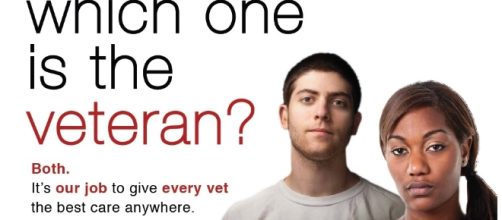Who do we think of when we hear the word veteran? Unfortunately, many people think of the typical male war hero, returning from battle and not women with families—let along single women. Reportedly, there are around 55,000 Homeless female veterans with children in the United States.
Try walking into a Veteran's Administration (VA) clinic or department—most of the greeters turn their heads and fail to greet women but greet the male veteran right behind them. No wonder why most women do not identify as veterans; it is a hassle and a major stressor that adds to diagnosed post-traumatic stress syndrome (PTSD), Military Sexual Trauma (MST), depression, and anxiety.
Women vets and homelessness
A 2011 study from the Department of Health and Human Services and the VA found that there are several root causes for homelessness among women:
- Trauma during military service (military sexual trauma)
- Substance abuse during military service (possible links to the MST being unaddressed and untreated)
- Post-military mental health issues
- Other medical problems (post-military)
There have been some major shifts in enhancing programs for women vets but our culture is still not caught up and fails to regard women as veterans. The fact that women suffer from combat stress, like their male counterparts, that is coupled with MST from their male counterparts is a shame and a black eye for our country.
VA and societal interactions with women vets
Allegedly, “the primary causes of homeless women veterans includes unemployment, disability, poor health and lack of treatment for PTSD, MST and/or anxiety problems.
Most women vets do not even admit that they have MST, yet “53 percent of homeless women veterans report that they experienced it.”
On more than one occasion, female veterans have reported that doctors in the VA did not even know what the term MST means, even when it was in their health record. Furthermore, try being a female veteran and parking in the veteran's spot at the grocery store. Most women get glares, nasty notes left on their cars, and are approached sometimes violently by men that question their veteran status.
It is 2017 and this is still a reality for women vets.
Approaches for better women’s care
Despite gaining some understanding of MST and women vet’s homelessness, the VA’s awareness for lactation issues and maternity issues are just now catching up with society. The VA maternity care social workers rarely return phone calls and women are left to deal with billing issues and pregnancy care coupled with bureaucracy without much help—add homelessness and poverty to that and women are dealing with unnecessary strife. One good thing that the VA does is provide women with free breast pumps, maternity nursing items, and ointment; however, each maternity care program varies from state-to-state.
This is problematic because women in one state are provided monthly maternity and nursing items, while in other states, like North Carolina—which has an outstanding poverty rate—does not provide women with new nursing items every few months like more progressive states do.
Resources
It is time to make sure our female vets are truly getting the respect and assistance that they deserve. If you know of any veterans in need they can get a hold of several outreach programs for housing and family assistance, including: nvf.org, va.gov, and operationhomefront.org.

